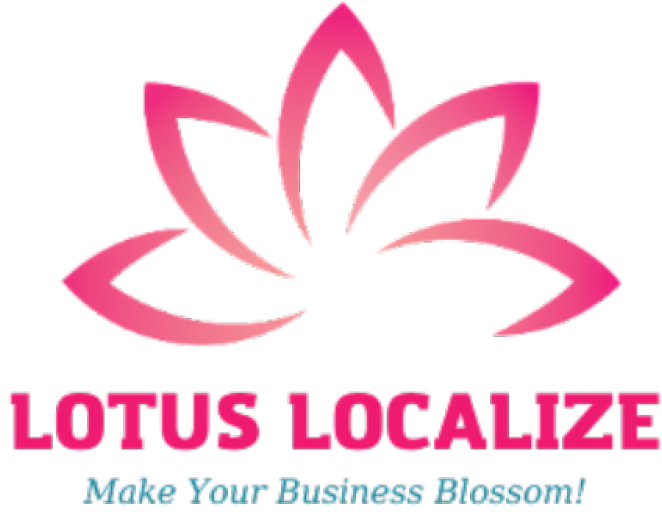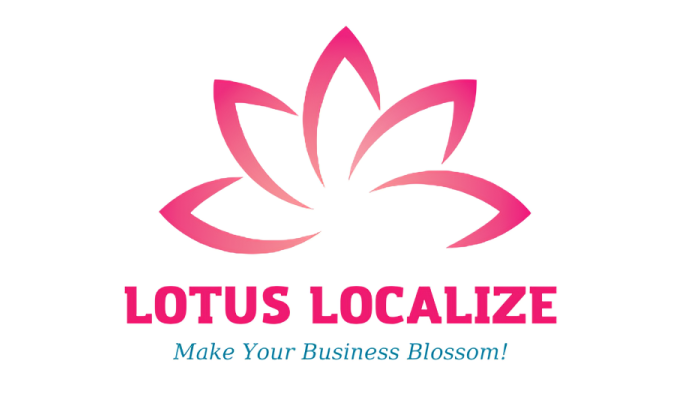
Manufacturing
✅ Accurate translation
✅ ISO standard service
✅ 24/7 support
✅ Multi-industry - multi-field
Manufacturing translation plays a vital role in today’s global economy, where businesses operate across diverse markets and cultures. As manufacturers expand their reach, the need for precise and effective communication becomes paramount. Accurate translation of technical documents, safety regulations, and product specifications ensures that critical information is conveyed clearly, minimizing the risk of errors and enhancing operational efficiency.
Have you heard the buzz about VinFast’s global expansion?
VinFast is an ambitious automotive manufacturer based in Vietnam, rapidly emerging as a key player in the global electric vehicle (EV) market. Founded in 2017 as a subsidiary of the Vingroup conglomerate, VinFast has quickly gained recognition for its commitment to innovation, sustainability, and cutting-edge technology. The company’s product lineup includes a range of electric cars and scooters designed to meet the growing demand for eco-friendly transportation solutions.

Their foray into the US and Indonesian markets is a remarkable feat, leaving many wondering: how did they do it? The secret strategy, as VNExpress highlights, is a potent blend of efficient manufacturing translation. Currently ranking 23rd in US electric vehicle sales with 927 VF 8 SUVs sold, VinFast’s success story is a testament to this approach.
In today’s interconnected world, international expansion isn’t just a daunting challenge; it’s a golden opportunity. This article takes you on a journey to uncover how effective translation, far from being a mere linguistic exercise, acts as a key that unlocks global success for brands like VinFast. It transcends language barriers, paving the way for international triumph.
What exactly is manufacturing translation?
Manufacturing translation is the process of converting documents, manuals, procedures, and other production-related information from a source language into a target language. The goal isn’t just accurate translation; it’s about ensuring the message resonates culturally and contextually within the target market. This is paramount for businesses expanding internationally, allowing them to overcome language barriers and maintain consistent, reliable production processes.

Crucially, this translation must also adhere to local legal requirements and quality standards. It’s far more than simple word-for-word conversion. Effective manufacturing translation demands deep industry knowledge, encompassing specialized manufacturing terminology, technical specifications, and cultural nuances, to guarantee the final product is both accurate and highly effective.
Manufacturing translation is crucial for ensuring that all stakeholders, including employees, suppliers, and customers, understand the necessary information in their native languages. Here’s a detailed overview of the types of documents that typically require manufacturing translation, along with their importance.
Types of documents requiring manufacturing translation
- Technical specifications: Detailed documents that outline the requirements for materials, processes, and product performance.
- Manufacturing process documentation: Instructions and guidelines that describe the steps involved in the manufacturing process.
- Quality control manuals: Guidelines and procedures for quality assurance and control in the manufacturing process.
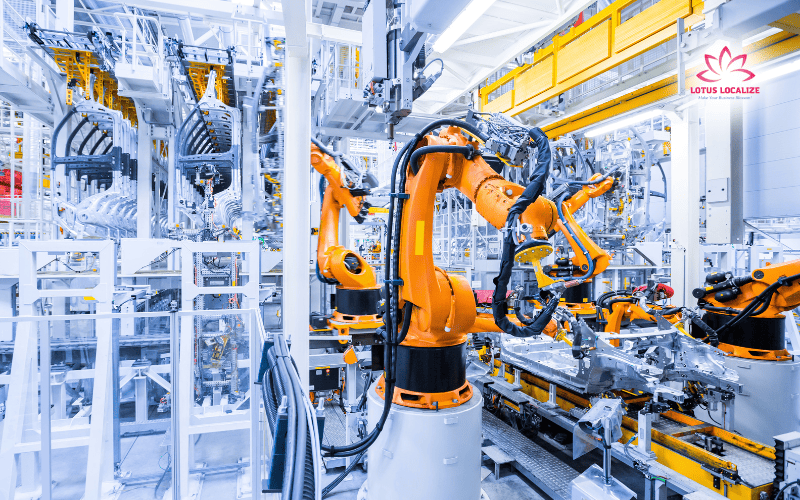
- Health and safety guidelines: Documents outlining safety protocols, hazard information, and emergency procedures.
- User manuals and operation guides: Instructions for operating machinery and equipment used in manufacturing.
- Product labels and packaging instructions: Information that appears on product packaging, including instructions, warnings, and compliance information.
- Training materials: Educational content used to train employees on manufacturing processes, safety, and equipment.
- Contracts and agreements: Legal documents outlining terms between manufacturers and suppliers or customers.
- And many other materials.
Importance of manufacturing translation
- Safety compliance: Accurate translations of health and safety guidelines are critical for ensuring that all workers understand and adhere to safety protocols, reducing workplace accidents.
- Operational efficiency: Clear and precise translations of manufacturing instructions lead to fewer errors, misunderstandings, and rework, enhancing overall productivity.
- Regulatory adherence: Many manufacturing industries are subject to stringent regulations that require documentation in the local language to ensure compliance and facilitate inspections.
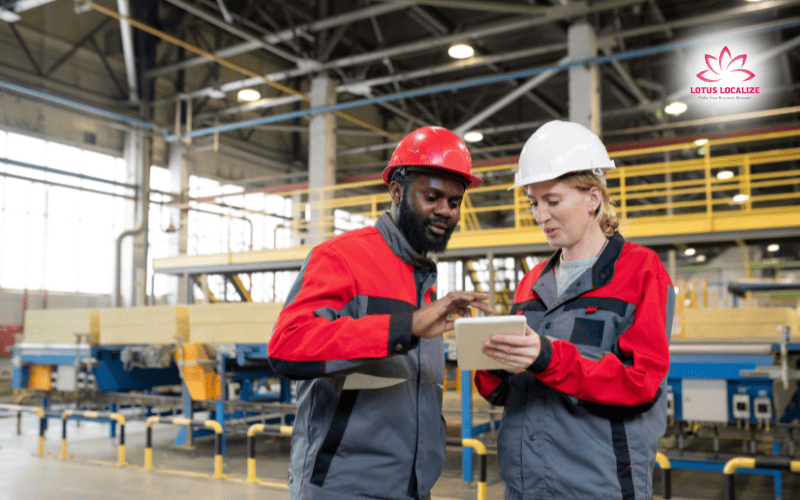
- Market accessibility: Effective translation allows manufacturers to expand their operations into new markets by ensuring that all documentation is accessible to local stakeholders.
- Employee training and integration: Providing training materials in multiple languages ensures that all employees, regardless of their native language, receive comprehensive training, promoting a cohesive and knowledgeable workforce.
- Risk mitigation: Accurate translations minimize the risk of legal issues arising from misunderstandings or miscommunications in contracts and regulatory documents.
In summary, manufacturing translation plays a crucial role in ensuring safety, quality, efficiency, and compliance in the manufacturing sector. It facilitates effective communication among diverse stakeholders, ultimately contributing to the success and reliability of manufacturing operations.
Challenges and difficulties in manufacturing translation
Manufacturing translation is a field that demands high precision and faces numerous challenges. These challenges include:
- Accuracy of specialized terminology: Translation in the manufacturing sector requires translators to have a firm grasp of complex and diverse technical terms. A minor error in translating these terms can lead to serious consequences, potentially impacting the production process or even resulting in financial losses.
- Keeping up with technological advancements: The manufacturing industry is constantly evolving with advanced technologies and new production methods. This demands that translators not only understand current technologies but also quickly grasp the latest trends and developments to ensure that translations remain accurate and timely.
- Compliance with international standards: Translated manufacturing documents often need to adhere to strict technical standards and international regulations. Translators must be well-versed in these requirements to ensure that the translations are not only linguistically accurate but also comply with legal and international standards.
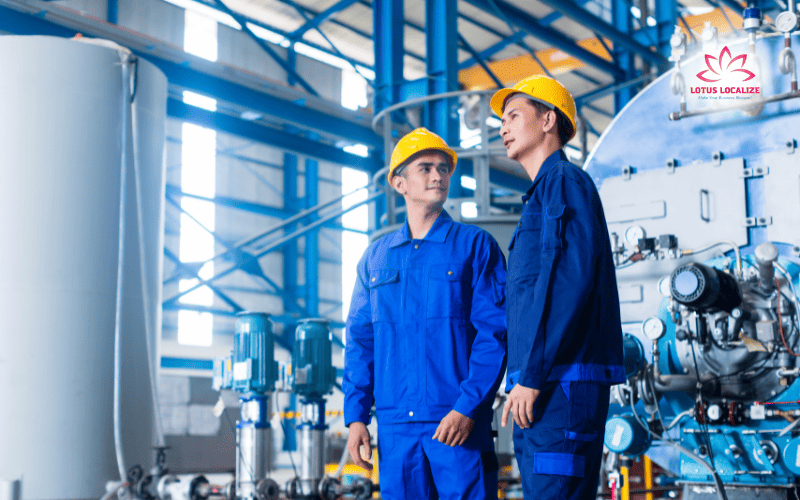
- Time pressure: In the manufacturing sector, time is of the essence. manufacturing translation often needs to be completed quickly to bring products to market on schedule. This creates significant pressure on translators to ensure quality without compromising project timelines.
- Working with various document types: Translators in this field must handle a wide range of documents, including user manuals, technical drawings, production processes, and other related materials. Translating diverse document types requires flexibility and the ability to process complex information from different fields.
- Collaboration with experts: Manufacturing translation is not solely the work of translators; it also involves close collaboration with engineers and industry experts. The ability to work effectively in a team and communicate efficiently with these professionals is a considerable challenge to ensure the accuracy and quality of the translations.
These challenges demand that translators possess in-depth knowledge, experience, and keen insight to meet the ever-increasing demands of the manufacturing translation industry.
What requirements must manufacturing translation meet?
Bringing products to international markets requires not only quality but also precision. For customers to confidently expand globally, manufacturing translation must meet several stringent demands:
- Accuracy and consistency: Manufacturing translation must ensure that all specialized terminology, technical guidelines, and production processes are conveyed accurately and consistently. This is crucial to avoid misunderstandings that could affect product quality and user safety. When documents are translated correctly, the product will function as originally designed, instilling confidence in customers as they introduce their products to the global market.
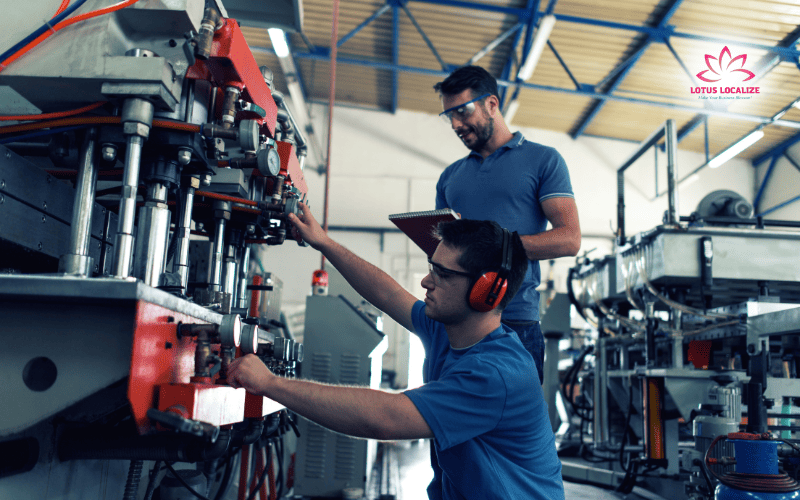
- Cultural and linguistic appropriateness: Each international market has its unique cultural and linguistic characteristics; therefore, manufacturing translation must align with the context of each target market. Understanding and correctly applying these cultural elements not only helps consumers easily relate to the product but also fosters a strong connection between the brand and the market, contributing to the global success of the product.
- Compliance with legal regulations and quality standards: Another critical aspect of manufacturing translation is ensuring that the translated content fully complies with the legal regulations and quality standards of each country. This helps businesses avoid legal risks and ensures that their products meet the highest safety and quality requirements in international markets.
- Efficiency and speed: To keep pace with product launch timelines and global marketing campaigns, the manufacturing translation process must be executed quickly and efficiently. When translation is carried out promptly and accurately, companies can launch their products at the right time, seize business opportunities, and effectively meet customer needs.
By meeting these requirements, manufacturing translation empowers businesses to navigate the complex global landscape, fostering effective communication, building trust with international partners, and ultimately driving success in the global marketplace.
How can you meet all these requirements?
Choose manufacturing translation at Lotus Localize!
At Lotus Localize, we understand that every product, service, and document is incredibly valuable, and it’s essential to translate them in a way that conveys our clients’ intentions effectively. Our team of professional translators is not only fluent in languages but also possesses a deep understanding of the specialized field of manufacturing translation. We are committed to providing you with translations that are not only accurate but also engaging and tailored to each specific audience.
Lotus Localize guarantees:




Lotus Localize – Your partner from the very first steps!
If you have any questions or need assistance with translation services for many industries: software translation, medical translation, financial and legal translation, education translation, marketing translation, government translation, media translation,…, please contact Lotus Localize at our hotline: 0866 224 968 or visit website: lotus-localize.com for the best solutions! Let Lotus Localize accompany you in achieving your goals of conquering the world, showcasing Vietnamese products, people, and culture on the international stage, and creating remarkable achievements!
Lotus Localize – MAKE YOUR BUSINESS BLOSSOM!
QUALITY PROMISE
Lotus Localize offers consistent, high-quality service delivery in all customer engagements. Our in-house translators and staff adhere to well-established business processes, allowing us to communicate properly, deliver on time, and surpass client expectations.
